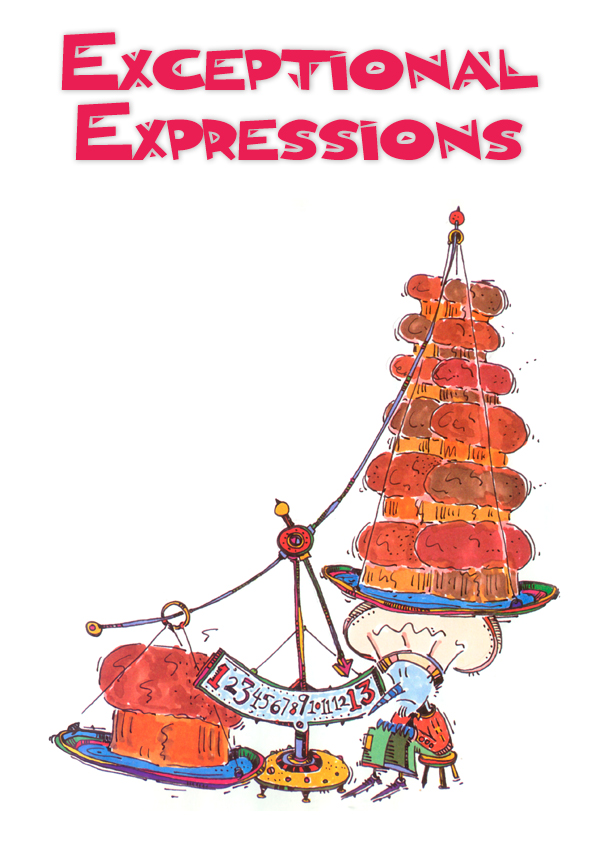There is more than “a baker’s dozen” of sayings and expressions in this chapter. You “know the ropes” by now, so let’s “call a spade a spade,” and “ferret out” how many of these sayings are familiar to you.
Aboveboard
The actions of anyone walking or talking on the deck of a vessel are usually clearly visible. Below deck, however, in the passageways and dark corners, mutinies, smuggling schemes, and other plots can be hatched unseen. Thus, the expression “to be aboveboard” came to denote being honest, open-minded, and not concealing anything.
Achilles’ heel
According to Greek legend, Achilles, the hero of Homer’s Iliad, was the son of the sea goddess Thetis and the great-grandson of the king of the gods, Zeus. Achilles was renowned for his strength and bravery. His courage was partly due to his belief that no weapon could kill him. When he was an infant, his mother dipped him in the river Styx. Its waters made him invulnerable, but Thetis forgot to dip the one part she held onto as she immersed him—his heel. The sun god Apollo knew this and told the Trojan prince Paris. During the Trojan War, Paris shot Achilles in the heel with an arrow. The wound proved fatal. In time, the expression “an Achilles’ heel” was coined to represent a person’s or a nation’s weak spot.
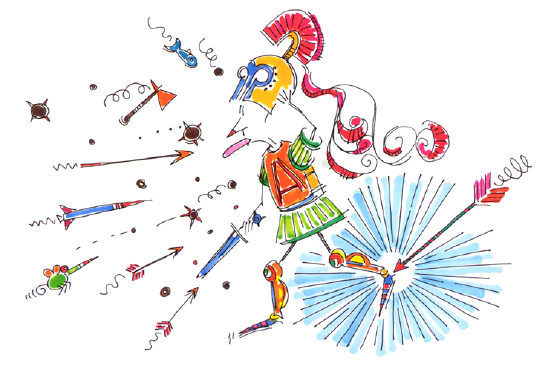

When Alexander the Great reached the shores of Asia in 334 b.c., he left his troops and took a side trip to Troy and the tomb of Achilles. There, he proclaimed himself the second Achilles.
Against the grain
The growth lines that run the length of a tree are referred to as the grain of the wood. Since ancient times, woodcutters and carvers have followed these lines to split, saw, and plane cut trees. Cuts that are made in this manner are smooth to the touch. Cuts that are made against the grain, however (for example, at right angles to the grain), are rough to the touch and usually produce slivers and splinters. The expression “to go against the grain” gradually came into use to represent the action of something that goes against what a person prefers or feels.
Apple of discord
According to an ancient Greek legend, the Trojan War began as a result of an apple thrown among the guests attending a wedding. Angered that she had not been invited to the wedding of Peleus, king of Thessaly, Eris, the Greek goddess of discord, entered the banquet hall and threw a golden apple into the crowd. When the guests read what was written on the apple—“For the fairest!”—three goddesses claimed the prize. They were Hera, the queen of Mount Olympus; Athena, the goddess of wisdom; and Aphrodite, the goddess of love and beauty. Paris, the son of King Priam of Troy, was summoned to settle the dispute. He chose Aphrodite, who had promised him the hand of the most beautiful woman in the world. Paris returned to Troy with his “prize” (Helen, queen of Sparta), but Helen’s husband, Menelaus, was determined to retrieve his stolen wife. He gathered an army of Greek leaders and sailed against Troy. Today, the phrase “apple of discord” is used to refer to an object or incident that causes problems.
Babel
“Babel” means both “a confusion of sounds” and “the place where such confusion occurs.” It traces its roots directly to the city of Babylon, which the ancient Greeks called Babulon. The Greeks had taken their name from the Hebrew name for the city, Bavel, which, in turn, traced it roots to the ancient Assyrian name for the place, Bab-ili, meaning “gate of the gods.” According to the Old Testament, the people of Bavel wanted to build a gigantic tower to reach heaven. Displeased, God interfered and confused their speech. Instead of speaking one common language, the people of Bavel began speaking in many different ones. Work on the tower ceased because the workers could no longer understand and communicate with one another.


Babylon was an ancient city on the Euphrates River in Mesopotamia, near modern-day Baghdad. Babylon was also the home of the Hanging Gardens of Babylon—one of the seven wonders of the ancient world.
Baker’s dozen
For centuries, bakers have known that increasing the number of air pockets in a loaf of bread makes the loaf larger. Since customers usually associated a larger loaf with more bread, some bakers took advantage of this fact and charged customers according to size, not weight. Around the 13th century, the English Parliament decreed that bakers were to sell their bread by weight and not size. Since it was almost impossible, at the time, to make sure a loaf weighed exactly a certain amount, many bakers decided to protect themselves by giving customers an extra slice of bread for every loaf they bought. A customer who bought a dozen loaves would receive a thirteenth loaf for free. Although scales and weighing procedures have improved, some bakeries still follow this tradition and give their customers “a baker’s dozen”—13 items for the price of 12.
Beef up
The word “beef” comes from the Old French boef, which itself was a derivative of an ancient root meaning “ox,” “bull,” or “cow.” We sometimes use the expression strong as an ox. Thus, “beef” also means “strength.” Since cattle are usually fattened before slaughter, “to beef up” came to mean “to increase or strengthen something.”
Beware a wolf in sheep’s clothing
According to tradition, around 600 b.c., a Greek named Aesop created a series of tales with morals or lessons. Animals representing human characteristics were usually the principal characters. One story told of a wolf who desperately wanted to have some sheep for dinner. To disguise his wolf-form, he wrapped himself in a sheepskin, entered the sheep pen, and ate his fill without being detected. Aesop’s message was one that remains true today: Be careful of individuals who are not what they appear to be.

The first printed edition of Aesop’s fables was in 1484, about 30 years after a German named Johann Gutenberg developed a new method of printing. Gutenberg is credited as the first European to print with movable type.
Beware of Greeks bearing gifts
The story of how the Greeks tricked the Trojans into bringing a huge wooden horse filled with armed Greeks within the walls of Troy was widely known to ancient Romans. When writing his epic poem, the Aeneid, the Roman poet Virgil used the style of Homer’s Odyssey as his model. In a passage meant to convey the idea of deceit, Virgil wrote, “I fear the Greeks even when they come bearing gifts.” Today, the phrase continues to be used by those who wish to caution others that there are some people who may outwardly express friendship but who are actually plotting the opposite.

In Book Two of the Aeneid, Virgil tells how the legendary Trojan prince Laocoön advised his fellow countrymen against bringing the great wooden horse within Troy’s walls. Unfortunately, his advice was not heeded. The Trojans felt his advice went against the gods’ wishes after they saw two snakes coil their bodies around Laocoön and kill him.
Beyond the pale
The Romans referred to the stake or boundary marker pounded into the ground to designate a county’s borders as a palus. There were many of these stakes (pali) throughout the Roman Empire, including in England. English borrowed the term and the practice, adapting the Latin form to “pales,” and used the stakes to mark the borders of the lands they took in conquest—Ireland, Scotland, and northern France. To be “beyond the pale” meant to be in land that was not ruled by England and to be beyond the reach of English law. In time, the phrase was used to refer to thieves and others who sought safety “beyond the pale.” Today, it also refers to behavior that is morally or socially unacceptable.
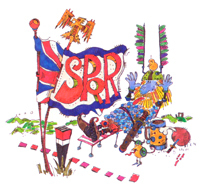

The Romans conquered England in the year a.d. 43. The area remained part of the Roman Empire until the early fifth century.
Call a spade a spade
The first recorded use of this expression dates to the first century, when the Greek writer Plutarch included it in his biography of Philip of Macedonia (father of Alexander the Great). Writers and speakers through the ages have used the expression in its original sense: to refer to or to identify someone or something directly.
Catch a Tartar
While opinions vary about the origin of the word “Tartar,” all agree that 13th-century western Europeans used the term to refer to invading Mongol tribes. The word was actually a derivative of the name the ancient Romans used to refer to Tartarus, the area in the underworld where evil people and monsters were sent for eternity. “Tartar,” however, may have been chosen because of its resemblance to “Tatar,” the name used to refer to several tribes that the renowned Mongol leader Genghis Khan conquered early in his career. According to tradition, when an Irish soldier was in battle with a Turkish soldier some time in the 1800s, the Irish soldier called out to his officer that he had “caught a Tartar.” When ordered to bring him in, the soldier replied, “I can’t. This Tartar won’t let me.” The story was repeated, and the expression “to catch a Tartar” came to represent a situation in which a person wins more than he or she can control. By itself, “tartar” is used to describe a violent, irritable, and stubborn individual. The word also describes hard deposits that form on your teeth. The origin of this meaning is uncertain, but may be linked to the Greek word tartaron, meaning “the dark underworld.”
Chew the fat
When Christopher Columbus and his crew first arrived in the Americas, they noticed that many of the native people chewed the dried leaves of a plant that was unknown in Europe. They also noted that some people placed burning leaves in a cylinder, called a tabaco, and inhaled the sweet-smelling smoke by sucking on the opposite end of the cylinder. A few sailors experimented with the process, found they liked the taste, and soon other sailors followed their example. The Europeans quickly adopted the “chewing” and “smoking” habit. However, since most boats were made of wood at that time, captains forbade smoking the leaves on board. If the ship’s store ran out of tobacco leaves on a voyage, many sailors turned to chewing leather strips, pieces of fat, or rags as a substitute. Because much of the chewing took place when the sailors had free time, the expression “chew the fat” was coined to refer to sailors sitting around telling stories. In time, to “chew the fat” came to mean sitting and chatting about nothing of great importance.
Curry favor
It has been standard practice for hundreds of years to clean a horse by currying it—that is, by grooming it with a currycomb. In 14th-century France and England, a fictitious horse named Fauvel, the hero of the book Roman de Fauvel (“Tale of Fauvel”), achieved great fame and popularity. He was, however, a sly and deceitful animal. In England, the horse’s name was Anglicized to “Favel” and the expression “to curry Favel” became popular to refer to a person who used lies and cunning to win another person’s attention and approval. “Favel” was sometimes pronounced “favor” by those unacquainted with the French novel and the horse.
Curse of the pharaohs
The pyramids of the pharaohs have fascinated and intrigued travelers for thousands of years. In recent centuries, many individuals journeyed to Egypt with hopes of uncovering mummies and other treasures. Yet, there were many individuals who advised against tampering with the tomb of a dead king. They believed the ruler’s spirit would bring disaster to any intruder. Because disaster did strike on occasion, a pyramid explorer who suffered misfortune was thought to be a victim of “the curse of the pharaohs.” Today, the expression occasionally is used when discussing people who involve themselves in projects that might cause them harm.

In 1922, the tomb of Tutankhamen was uncovered by Howard Carter and Lord Carnarvon. After Carnarvon’s untimely death from an infected mosquito bite, Carter continued excavating the tomb for 10 years.
Cushy job
No one is exactly sure about the origin of this phrase. Many trace its roots to India. British officials and soldiers who were living there in the 19th and early 20th centuries often heard the phrase hamari khush hai (“it is my pleasure”). They soon adapted the word khush to “khushi,” then to “cushy,” and used it to describe a position or job that was not only pleasant, but simple and easy to do.

Cut the Gordian knot
According to Greek legend, a king named Gordius once ruled Phrygia (present-day central Turkey). As a gift to the gods, he dedicated his wagon to Zeus. Gordius then tied a very clever knot of cornel bark around the yoke. According to a local oracle, whoever untied the knot would conquer and rule the Eastern world. Many tried to untie the knot but failed. In 333 b.c., when Alexander the Great passed through Phrygia on his march eastward, he entered the old Phrygian palace where the yoke was on display and carefully examined the knot. He then pulled his sword from its scabbard and sliced through the twisted fibers. Ever since, “to cut the Gordian knot” has meant to solve a difficult problem with one dramatic stroke.
Dog days
In the Northern Hemisphere, July and August are the hottest months of the year. The ancient Greeks believed that the intense heat resulted from the fact that, during this period, the sun can be seen along the same celestial longitude as Sirius (from the Greek seirios, meaning “burning”). The brightest star in the sky, Sirius is a star in the constellation Canis Major (“the Greater Dog”) and became known as the Dog Star. Gradually, the phrase “dog days” developed to refer to those days in July and August that are oppressively hot.

Archaeological evidence suggests that around 12,000 b.c. the Asian wolf was domesticated and became a companion to nomadic hunters living in Asia Minor—suggesting that the wolf, not the dog, was the first example of “man’s best friend.”
Feather one’s nest
By instinct, many birds pluck the soft down from their breasts to make a comfortable, feathery lining for their nests. In 1590, the English poet and dramatist Robert Greene wrote, “She sees thou hast fethered thy nest, and hast crowns in thy purse.” Thus came this expression meaning “to provide for one’s comforts, especially by making money.”
Ferret out
Sometime in the 10th century, European traders began importing small animals with pink eyes and yellowish fur from Africa. Because these creatures were quite tame and easily trained to hunt, the Europeans quickly saw their usefulness and taught them to hunt rats. To name their new “rat-catchers,” the Europeans borrowed the Latin word fur, meaning “thief,” added a suffix which implied “small,” and formed the word “ferret.” Soon the ferret was being used “to ferret out” all types of burrowing creatures, especially rabbits. In the 1800s, the English writer Charles Dickens first applied the phrase “to ferret out” to detective work.
Go berserk
According to Norse mythology, a fierce and reckless warrior named Berserk fought for Odin, the Norse god of war. Berserk and his equally savage 12 sons, known as Berserkers, entered battle dressed only in bear or wolf skins. The Scandinavians borrowed the name of these legendary heroes to refer to any fierce fighter. Gradually, the term came to describe anyone who became so reckless in his fury that he fought both friend and foe.
Grin like a Cheshire cat
The Cheshire cat in Alice’s Adventures in Wonderland was described as disappearing gradually from Alice’s view—with the grin being the last part of the cat to vanish. How the expression came about is unclear. Some say that originally the cheeses in the English district of Cheshire were shaped like cats that seemed to be smiling, since the district had special privileges, including the right not to pay taxes. Today, the expression means “to grin mysteriously.”

Jig is up
The actual derivation of “jig” is lost, but most believe it came into English via the French word giguer, meaning “to dance,” or from the French word gigue, meaning “a fiddle.” Whatever the case, for hundreds of years the English have used “jig” to mean a lively dance. Around 1600, the English also began to use “jig” to mean “a bit of trickery.” “The jig is up” grew to mean that one is no longer fooled, or that one knows about the trick being played.
Know the ropes
Just how this expression began is uncertain, but sailors were most likely the first to use it. Their job required a thorough knowledge of how each rope and line on their ship was handled. In time, others adopted the phrase and used it in a more general sense to mean being familiar with all the details of a particular situation.
Learn by heart
A common belief in ancient times was that the heart, not the brain, was the center of intelligence, memory, and emotion. Thus, when a person learned new material, he did so with his heart. This theory developed because the heart was the most noticeable of all internal organs. When the heartbeat stopped, so, too, did the person’s life. As this belief was handed down through the centuries, “learning by heart” quickly developed to refer to the process of committing facts or words to memory. The Romans combined the prefix re (“again”) with the noun cor (“heat”) to form the verb recordari, meaning “to remember” and “to recollect.” In 1374, the English poet Geoffrey Chaucer was the first to use the English phrase “learn by heart.”
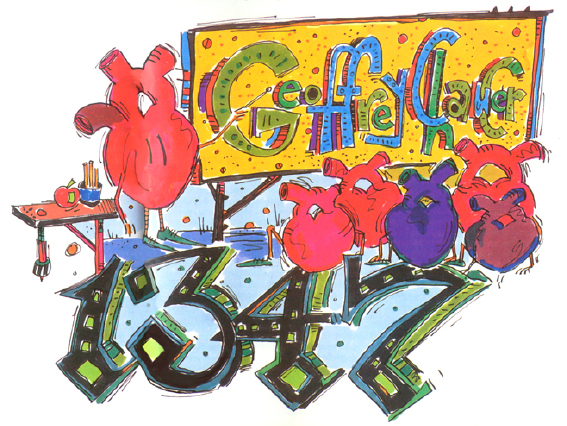

On December 3, 1967, the first heart transplant was performed by Dr. Christiaan Barnard. The heart of a 25-year-old accident victim was placed into the body of a 55-year-old grocer. The grocer lived 18 days before succumbing to pneumonia.
Leave no stone unturned
After the Greeks defeated the Persians at Plataea in 497 b.c., rumors spread throughout the Greek camp that the Persians had concealed a huge amount of treasure near the battlefield. Determined to find this treasure, their leader, Polycrates, sent a messenger to the Delphic oracle to ask what action he should take. The Greeks believed Apollo, the god of the sun and of predicting the future, would make known his wishes through a priestess. When Polycrates learned that the oracle told him “to leave no stone unturned,” he decided to have his men turn over every stone in the area. Their efforts were rewarded, as they found the Persian riches. Today, the expression means to persist in seeking a specific goal.
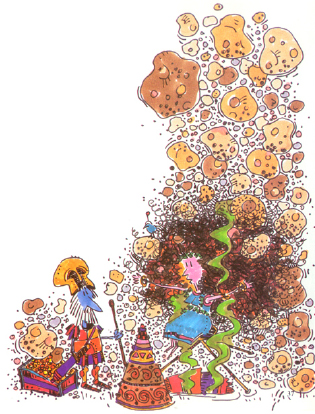
Liar of the first water/First-class liar
For centuries, Arab gem traders carried on a large and profitable business selling precious stones, especially diamonds. Every diamond was examined and ranked according to its color and quality. It is believed that these traders compared a diamond’s shine to the sparkling of pure, fresh water. By the 17th century, it was customary to classify the best diamonds as being “of the first water,” the next best as being “of the second water,” and so on. Although this ranking system no longer exists, the phrase “of the first water” has persisted as an expression indicating perfection in a particular area. Eventually, the word “liar” became attached to the phrase to refer to an extraordinary liar.
Lock, stock, and barrel
This American expression probably dates to the American Revolution and refers to the three most important parts of a gun—the lock, or firing mechanism; the stock, or handle; and the barrel, the tube, or cylindrical part. The three words together referred to the entire gun. Over time the phrase has come to mean the whole of anything.
Long time, no see
This expression is believed to have entered the English language from pidgin English. A pidgin language has no native speakers. Rather, it is a mixed way of speaking that incorporates words from one or more languages with the basic form of grammar from one of them. Pidgin English is a simplified form of English that was used by certain peoples of east Asia and the South Pacific in dealing with foreigners. “Long time, no see” is thought to be the pidgin English translation of the Chinese phrase hao jiu bu jian. Other pidgin English phrases are chop-chop (literally “quick-quick” or “hurry”) and no can do.

Mad as a hatter
Today, we use this phrase to refer to someone who acts completely crazy. While its history is a matter of debate, a probable origin involves the trade of hat making. In the 1700s and 1800s, milliners (hat makers) treated felt hats with mercuric oxide, a chemical compound. Unaware that mercury fumes were poisonous, the milliners wore no protective covering. Over time, the fumes harmed their nervous systems, causing a loss of teeth, uncontrollable trembling, and other unexplainable behavior. Often, death was the result. Because no one at that time linked mercury fumes with the milliners’ bizarre conduct, the expression “mad as a hatter” came into use.

In Lewis Carroll’s famed novel Alice’s Adventures in Wonderland, first published in 1865, the Mad Hatter is very impolite and very eager to confuse people with his mysterious riddles.
Meet the deadline
Reporters and authors know deadlines must be met for their story to be told. But today’s deadlines are not the matter of “life and death” they once were. In the 1860s, at the Confederate prison camp at Andersonville, Georgia, the expression “deadline” was coined to represent a line drawn approximately 17 feet from the camp’s fence. Officers on duty had orders to shoot any prisoner who crossed the deadline.
Out of the frying pan and into the fire
The idea this expression conveys—going from a dangerous situation to an even more dangerous one—dates back at least 2,000 years. The ancient Greeks used “out of the smoke and into the flame.” The early Portuguese said “to fly from the frying pan into the coals.” The French first used the phrase as we know it today during the 16th century, a time of great religious dissent.
Parting shot
Recognized as fearsome fighters, the ancient Parthians defeated many who attempted to invade their lands in what is today northwest Iran. The Parthians rode their horses into battle, shot a volley of arrows at the enemy, and then galloped away from a counterattack. As they withdrew they turned backward in their saddles to shoot another volley. The expressions “a Parthian arrow” and “a Parthian glance” developed to mean “a keen backward glance.” In modern times, the expression “a parting shot” has become more common and refers to final, sarcastic words a person may use as an end to an argument or discussion.
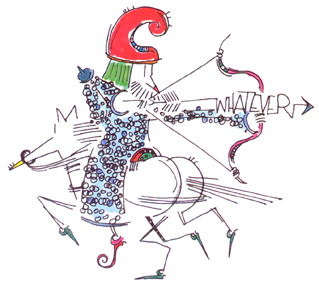
Philippics
After Philip II gained control of his native Macedonia in the fourth century b.c., he looked south to the conquest of the prosperous Greek city-states. He began to forge alliances with some Greek leaders, but one Greek, a man named Demosthenes, was not deceived. Attempting to expose Philip’s true intentions, Demosthenes delivered a fiery speech to his fellow Athenians. He urged them not to negotiate with Philip, but to defend their freedom on the battlefield. Failing to win public support for his views, Demosthenes waited. A few years later, he delivered a second passionate speech. Only after he delivered his third speech did the Greeks react, but Philip’s well-trained troops still overwhelmed the Greeks. Demosthenes’ speeches, however, were not forgotten and soon came to be known as the Philippics. Today, writers, journalists, and public speakers use the expression “philippic” to refer to a bitter verbal attack made by one person against another.
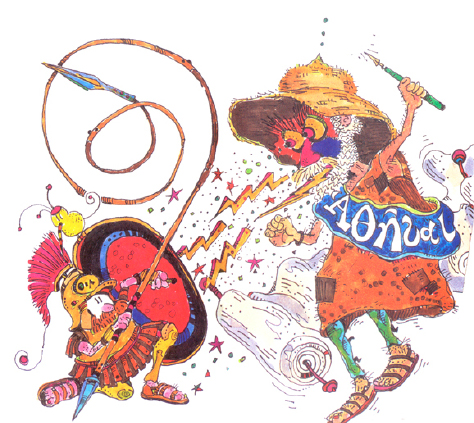
Pour oil on troubled waters
Roman writers of the first century suggested that sailors pour oil on the raging waters of a stormy sea to calm the waves. In time, the practice ceased. In the 1770s, Benjamin Franklin referred to this piece of advice in one of his works. A century later, when whale oil was used widely throughout the Western world, the idea of using oil to calm raging waters was once again promoted by some individuals. In time, the calming effect of oil came to be used as a metaphor and applied to people. In this case the oil represents whatever help or comfort a person may give to someone in a difficult situation.
Pull strings
In ancient times, hand puppets were a common form of entertainment throughout Europe. They fell into disuse in the early Middle Ages, but by the year 1000, their popularity had revived. The theme of medieval puppet shows was often religious and focused on stories from the Bible and lives of the saints. Instead of hand puppets, however, performers often used marionettes, which are elaborately carved little figures that are worked by strings. While the marionette was seen by all, the person who pulled the strings was not. Soon the expression “to pull strings” came to mean to influence from a distance.

Put the cart before the horse
Exactly when this expression came into use is unknown, but the idea of action against common sense dates back to ancient times and is found in writings thousands of years old. The phrase most similar to our English phrase was the one used by the Romans: currus trahit bovem praepostere, or “the cart drags the ox in the reversed order.”
Red-letter day
The practice of using the color red to mark special holidays, festivals, and religious days on calendars began during the Renaissance. Since these times were usually joyful occasions, the expression “a red-letter day” came to mean “a memorable or joyous occasion.”

Here’s the word “red” in a few other languages: In French, it’s rouge; in German, rot; in Greek, kûkkivo; in Italian, rosso; and in Portuguese, vermelho.
Red tape
From the 1700s through the early 1900s, red ribbon was used to tie official forms and documents in Europe. Cutting this ribbon took time, especially as it was often done slowly and according to special rules. To refer to the process, the expression “red tape” developed. The phrase continues to be used today to refer to the rigid application of regulations and routines that result in delays in getting business done.
Scot-free
“Scot” is an Old English word that is still used today to mean “a tax” or “a payment.” The expression “to go scot-free” gradually evolved as a reference to someone who gets away without paying a tax or without punishment.
See red
This expression, which means “to be angry” or “to become angry,” traces it origins partly to the long-standing association of the color red with anger and partly to bullfighting and the practice of waving a red cape to rouse the bull—even though bulls are color-blind.
Show a white feather
In ancient Egypt, Persia, India, and China, cockfighting was a popular sport. Gamecocks were raised and trained to fight against each other in a ring or arena. People in some areas of the world have continued this practice through the centuries. In the 18th century, some believed that if a cock had even one white feather, it was a coward and was sure to be a poor fighter. Soon, any individual who acted cowardly was referred to as someone who showed the white feather of his or her personality.
Slush fund
In the 19th century, cooks on ships used salt pork as a key ingredient for many meals because it kept well for long periods of time. When cooked, however, it produced large quantities of grease. The grease was then sold when the ship reached port, and the money used to buy small luxury items for the crew. This grease was called slush. The money earned from the sale of grease came to be called a slush fund. Today, the phrase is often used to refer to money used for bribery, political pressure, or other corrupt purposes, or to unrestricted money obtained from a variety of sources.

So long
The actual derivation of this phrase is a matter of debate. Some trace its history to the Arabic greeting salaam, from the Arabic verb aslama, meaning “to seek peace.” While salaam is an ancient greeting, records indicate that “so long” came into use only in the late 1850s.
Steer (sail) between Scylla and Charybdis
According to Homer, the hero Odysseus and his crew had to sail their ship between Scylla and Charybdis, two dreadful sea monsters. Many captains had tried the feat, but all had failed. Scylla was a dreadful sight as her six heads, each atop a long neck, emerged from a cave on a cliff overlooking the sea. Just across the strait churned Charybdis, a hideous whirlpool that three times a day sucked in and then spewed out the sea and all that happened to be in or on it. Only Odysseus survived the passage. He did so by clinging to a fig tree on one of the cliffs. The expression “to steer between Scylla and Charybdis” now means choosing a safe course between two equally dangerous or difficult choices.
Swan song
According to tradition, many ancient peoples believed that swans, creatures whose “voices” are not as melodious as those of other birds, burst into clear song when they felt death nearing. The fifth-century b.c. Greek philosopher Socrates is said to have explained that this voice transformation occurred because the swans were rejoicing. They knew that they were sacred to the god Apollo and that at death they would return to Apollo, who was the god of music and song. European literary tradition borrowed this thought, and the last work of a performer or artists is called a swan song.
Three sheets to the wind
The nautical term “sheet” refers to the rope or chain attached to the lower end of each sail. By pulling in or letting out on the sheet, you can control the angle of the sail. On very windy days, to ease the boat’s heeling or tilting to one side because of the wind, sailors often loosened the three main sheets. The result was a vessel with flapping sails wavering on its course. Soon the phrase “three sheets to the wind” came to refer to anyone seen tottering along, especially someone who has drunk too much alcohol and cannot walk a straight line.
Turn turtle
Mariners use this phrase and the abbreviated form “turtled” to refer to a boat that has capsized and is floating helplessly upside down in the water. The source of this phrase dates to the days of the early mariners. On long voyages of exploration and discovery, sailors were always on the lookout for new food possibilities. The meat of the huge sea turtle was especially delicious. Catching these creatures, however, took skill and patience. The natives of the Caribbean islands were experts. They lay in wait as the female sea turtle came ashore to lay its eggs, then seized the creature by its flippers and turned it over, rendering the animal helpless. This method became known as “turning turtle.” Soon sailors were applying this phrase to a boat rendered helpless because it had overturned.
Under the aegis of
“Aegis” is the English spelling of the Greek noun aigis, which referred to the short goatskin cloak worn by Zeus, the king of the Greek gods. By some ancient accounts, the skin had belonged to Amalthaea, the beloved goat whose milk had nourished Zeus after he was born on the island of Crete. Today, we use the phrase to mean “under the protection of.”

The Aegean Sea lies between Greece and Turkey. Its southern boundary is the island of Crete. To the northeast, the Sea of Marmara links it with the Black Sea. The Aegean Sea is actually a part of the much larger Mediterranean Sea.
Unstrung
Medieval English archers found that by using the yew (an evergreen shrub), they could make a bow that stood as tall as the archer himself. A yew bow also had enough power to send an arrow 100 yards and have its point enter an oak tree (one of the hardest known woods) to the depth of one inch. Unfortunately, this bow had one major disadvantage. When not in use, it could not be kept strung. The constant tension weakened the wood and, in time, prevented the bow from bending properly. Archers found it necessary to loosen one end of the bowstring on yew bows when they were not using them. This placed the archer at a distinct disadvantage. A yew bow required time to restring, a courtesy no enemy would grant. This fearsome prospect gave rise to the expression “to be unstrung.” At first, it referred to a nervous archer with a loosened bowstring. In more recent times, it has been used to refer to anyone who feels extremely uneasy or fearful.
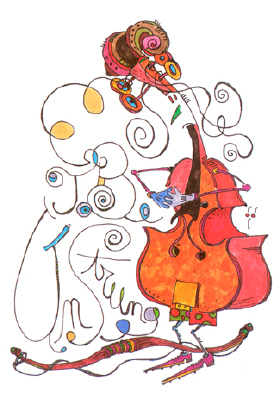
White elephant
In the southeast Asian country of Thailand (formerly called Siam), it was a national tradition to present the emperor with any white elephant that was captured. These rare elephants were sacred to the emperor. It was commonly believed that if the emperor became dissatisfied with one of his nobles, he would order a white elephant sent to him. Unable to use or destroy the sacred animal, the noble was forced to bear the cost of maintaining the huge beast. In 1629, the emperor of Siam sent King Charles I of England an elephant (records do not say whether it was white). The cost of its maintenance became a great drain on the royal treasury. Gradually, the phrase “white elephant” came to designate possessions that are expensive but useless.

Thailand is one of the world’s major exporters of pineapples and natural rubber. Its capital city is Bangkok.
Work of vandals
The Vandals were a Germanic people from southern Scandinavia who settled on the south coast of the Baltic Sea. In the year 439, Gaiseric, king of the Vandals, took Carthage and drove out the Roman rulers. Sixteen years later, he and his troops sacked Rome itself. The Roman Empire in the West never recovered from this defeat, and as a result, the Vandals were feared throughout the Mediterranean world. Not until the late 1700s, however, was their name used to denote the willful destruction of property. A French bishop is credited with coining the term vandalisme, which entered the English language as “vandalism” and gave rise to this expression.
Worth one’s salt
Because the Romans prized salt as much for its flavor as for its preservative qualities, they made it a rule that, as part of their pay, Roman soldiers would receive an allowance of salt or money to buy a specified amount of salt. This salt or money was called salarium. In time, salarium became the root of the English word “salary,” and the expressions “worth one’s salt” and “to earn one’s salt” developed. See also salary.
